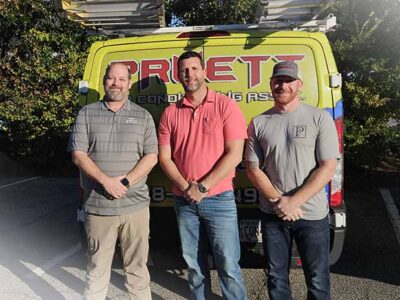
Sedan, Minivan or SUV? Apple, Android or Windows? There are plenty of options out there vying for our attention, but not all of them deserve it. If the heater in your Macon, Georgia, home seems to be drawing its final breaths, it’s time to start looking for a replacement. But as with the decision to replace your car or phone, you have options. Whether you choose a furnace, heat pump, or ductless unit, there are several factors to consider to ensure that you install the best type of heating system for your home.
Important Factors
While a central air furnace offers many advantages, it may not be the best fit for you and your family. This is why you need to weigh several factors before you make that purchase.
- Pay attention to the size of the unit – An oversized system will reduce heating efficiency and comfort.
- Consider the effectiveness of the system – Look for the Energy Star label and efficiency ratings.
- Think about the system’s power – Units differ in heating power or capability. If you typically experience very cold winters, a more powerful system should make the list.
- Think about your indoor air quality – Many units today offer excellent options to help you manage humidity and ventilation.
- Consider the price to install and maintain the system – The size and type of unit will impact installation costs.
Our HVAC technicians will assess your home to make sure that you select the right unit. Failing to take key factors into account could mean reduced comfort and higher utility bills.
Furnace
A central air furnace is the most common type of heating system used. It works by distributing heated air throughout the home via a network of ducts. Furnaces are powerful and can keep your home warm no matter the outside weather. However, there are some drawbacks with central heating. These systems might not be as effective as ductless units, for example. Inconsistent heating is common as you’ll find cold spots throughout your home.
Without regular maintenance, your furnace will allow dust, dirt, and other particles to build up. But with the proper care, it can keep you comfortable and won’t reduce your indoor air quality.
Heat Pump
A heat pump moves the heat rather than generate it. For cooling, it transfers warm air from inside the home to the outdoors. In the winter months, it pulls heat from outside. Since heat pumps rely on moving heat rather than producing it, they do not consume a lot of energy.
There are two main types of heat pumps: air-source and ground-source (or geothermal). Air-source heat pumps utilize heat in the air, while a ground-source heat pump takes advantage of the heat from the ground outside. Geothermal heat pumps are more costly to install than their air-source counterparts because loops need to be placed several feet below the surface. Overall, heat pumps tend to be more expensive than furnaces, but they can also be a wise investment with regard to long-term savings.
Ductless Heating
A ductless heating system does not require ductwork. They require less maintenance and do a better job of keeping the air clean than regular furnaces or heat pumps. They are also very efficient and flexible since the air handlers that blow heated air into the home can be placed anywhere in any room. However, take into account that you would need several air handlers placed throughout your home to heat the entire area, and this could become quite expensive.
Installing a new heating system can be a daunting and stressful process, but when you find the right fit, your home will be efficient and comfortable for many winters to come. If you have any questions regarding heating systems or need heating system installation services heating options, call Pruett Air Conditioning at 478-953-4986.
Image provided by Shutterstock

